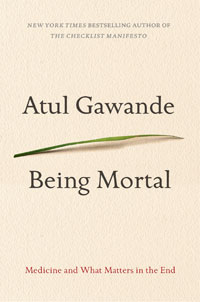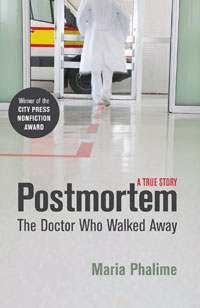Reviews

Being Mortal
- By Atul Gawande
- Review by Dr Sam Dawson, Specialty trainee, anaesthetics, Northern Ireland
Atul Gawande barely needs an introduction. He is the author of three bestselling books, winner of multiple awards for writing and Professor at Harvard Medical School. He was also a key figure in the implementation of the WHO checklist revolution.
His new book Being Mortal is a compassionate yet unflinching look at what mortality means in the 21st century. In it he explores the way in which modern medicine is letting our patients down at the ends of their lives whether in nursing homes, hospitals or hospice. At the same time, he reveals the people and institutions redeeming the situation with unparalleled passion and creativity.
Gawande does this by telling the stories of his patients facing cancer, of his neighbours and, most movingly, of his own family as they face old age, decline and death. He weaves together research, philosophy, historical study and personal anecdotes to show that many of us are neither living well in our last days nor dying the way we want.
Most damning of all, however, is the realisation that the medical profession is not only hapless in the face of this suffering but acting harmfully as a result of paternalism, lack of imagination and fear.
Gawande’s previous book The Checklist Manifesto ushered in a new global paradigm of perioperative safety with a simple, yet radical, idea. Being Mortal could do the same for end-of-life care.
I read most of this book in my oncall room, pausing to attend the critically ill in the wards, theatre and emergency department in which I work. This added extra poignancy to what is already an emotional, compelling and challenging book. It isn’t perfect – at times the interlinking of stories is disorientating and the section on assisted dying appears somewhat tacked on.
However, this book is for anyone who has ever stared speechlessly into the eyes of someone who knows they are dying, or who has had the difficult task of counselling their relatives. In fact, it is for anyone who wants to live well, help others live well and, in the end, die as well as they can. What would a new era of ingenuity, empathy and dignity look like for our patients as they approach the end of their lives?
It is obvious Gawande is not entirely sure, but in Being Mortal he is asking the right questions and exploring novel solutions to a situation we desperately need to improve.

Postmortem: The doctor who walked away
- By Maria Phalime
- Review by Dr Anand Naranbhai, Intern at New Somerset Hospital, Western Cape, South Africa
After practising clinical medicine for four years, Maria Phalime decided to stop. Postmortem: The Doctor Who Walked Away tells the story of her search for an explanation and provides a useful commentary on the profession.
The book is divided into two parts. In the first part, Phalime searches within herself for reasons why she left. She tells of her life growing up in Soweto and then studying medicine at the University of Cape Town. She also documents her experiences as an intern in the United Kingdom and then as a community service officer in Mannenberg and Khayelitsha. Finally, she discusses the years during which she worked her way out of clinical medicine and into a new career.
In the second part of the book, Phalime searches outside herself, wondering if there were external factors that played a role in her decision to leave. She interviews others with various experiences in medicine as a way of providing perspective on her own story. I found reading the first part of the book laborious, although I was interested in her childhood and high school years.
From then on the cliches and anecdotes were unoriginal to my ears, although these do provide, for the general public, one account of what practising medicine in the public sector can be like.
The second part was far more enlightening. I enjoyed reading the interviews she conducted with those who have either left clinical medicine, or are still practising. For comedian Riaad Moosa, it was a natural progression away from medicine and into comedy; for ‘Nina’ (pseudonym), it was the combination of clinical depression and being a junior doctor in the South African public health sector.
This second part of the book highlighted common but often benignly accepted issues that we face in the medical profession. In the end, Phalime’s decision to leave is multifaceted. She concludes: “It was tough, it was sad, and I left, that’s all.” She practised medicine during the dark age of HIV-denialism, and in the often frustrating, pressured and disheartening South African public health sector.
There is a bigger lesson in the book: in an interview with Stellenbosch University Dean of Health Sciences, Professor Jimmy Volmink, Phalime is told: “We are all on a journey, and sometimes that journey takes us overseas, into the private sector, or even out of the profession altogether. People have got to be allowed to take that journey.”
Phalime is on her journey, each of us is on our own, and for our patients, maybe the point of what we do by caring for their health, is to give them an opportunity to take their own journey.